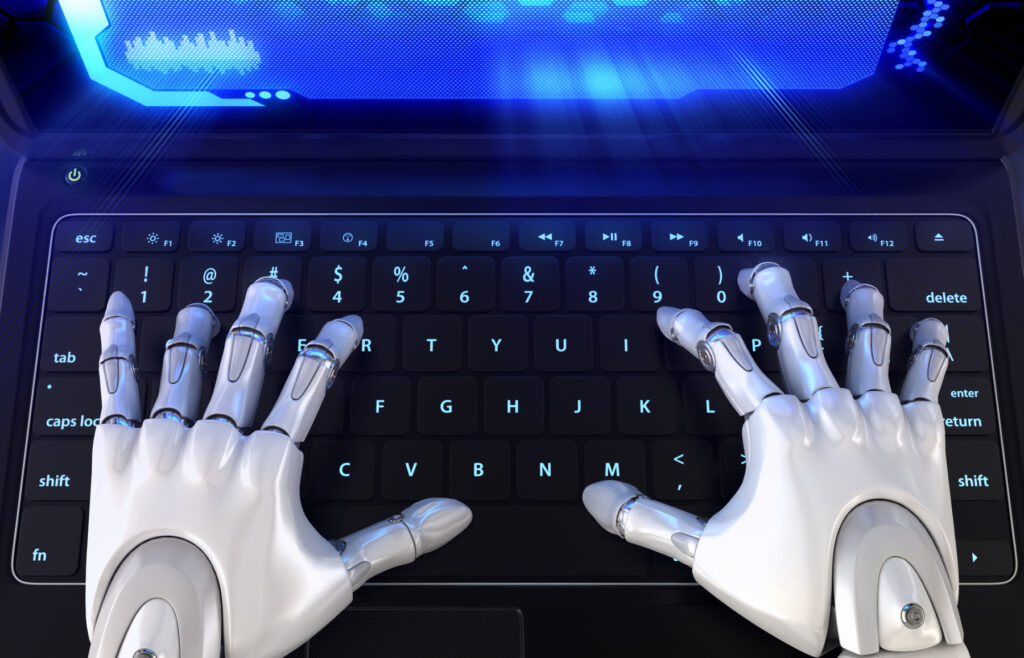It’s happening again. The woebots are after my job.
Am I worried?
Not really, and I’ll tell you why.
But first, in case you haven’t guessed, the word woebot is a combination of woe and robot—a term I’ve been using for anything related to artificial intelligence (a modern innovation that brings fear and misery to certain segments of the population.).
Coincidentally, Woebot is also the name of an app designed to help humans deal with stress, anxiety, and other difficulties. Depressed about woebots stealing your career as a life coach? There’s an app for that.
Here’s how woebots have impacted my own work life.
Before I became a time-travel thriller author, I was a medical transcriptionist, which is a healthcare professional who listens to doctor-dictated reports and types them up for permanent record.
I held that position for eight wonderful years before voice-recognition technology came along and changed the face of the industry. Doctors could now dictate their reports directly to text, removing the human transcriptionist from the equation.
Sure, I still had a job, but it was evolving into something quite different from what I’d signed up for. Instead of typing reports from scratch, I was now listening to the dictation and proofreading the computer-generated reports for accuracy. Just try staying awake for that.
I probably would have been fine if that had been the only change, but because we could now finish our work in half the time, transcriptionists were being assigned other duties, which sometimes included interacting with real, live patients (ack!). As an introvert who’d chosen transcription for the solitary work environment and a passion for written words (even if they weren’t mine), I just wasn’t prepared to pivot to that degree.
And so ended my career as a medical transcriptionist.
It was serendipitous, though. Without the forced hiatus, I wouldn’t have been inspired to pursue my other big, crazy dream: writing and publishing a novel. And write a novel I did. In fact, I’ve since released two books in my TimeBlink series—with number three in the works.
For this, I will always be grateful. While I admit it’s been the most difficult, stressful, energy-sapping, hair-pulling job of my life, it’s also been the most fulfilling. I get to play make-believe every day, creating stories that titillate and entertain and invoke feelings of love, hope, surprise, fear, and terror in my readers. My hope is that I will continue writing such stories until the end of my days. But will I be able to sustain it until then?
Now that ChatGPT and other AI writing tools have arrived on the scene, some members of the writing community have gone into full DEFCON 1. They believe that thanks to AI, their livelihoods are in danger of extinction, and they’re rallying the troops for war.

I don’t know how they plan on fighting it. The technology is already here and getting more sophisticated by the day. We should probably just learn to live with it and accept that some people are going to misuse it (Hey, AI, write a paper about the effects of greenhouse gases on the past and current climate).
Will it put the human writer out of a job completely?
I don’t think so. If we use these aids properly and ethically alongside the AI tools we’re already using—tools like Grammarly and ProWritingAid—I think they’ll become as indispensable and accepted as spellcheck someday. It may even become part of a computer’s standard operating system.
Myself, I won’t be using AI to create ANY part of my novels (due to its derivative nature, I’d like to steer clear of any potential copyright issues…the words had to have come from a real human at some point, right?), though I’m intrigued by its potential to help with the marketing end of things.
To test this, I asked ChatGPT to “create a post about my novel, TimeBlink, downplaying the sci-fi angle.”
Here’s one result that’s not all that bad:
“If you’re tired of time travel stories that are all about science and technology, then you need to read TimeBlink! This novel demonstrates that time travel can be emotional, intense, and full of unexpected twists. #TimeBlink #NotJustSciFi”
Mind you, this example does read more like an ad than a social media post, but at least it gives me a jumping-off point. Inspiration. From there, I can tweak it to my heart’s content, giving it my own personal spin.
Anyway, I refuse to worry about this technology too much. I’d rather experiment with it and embrace it as best I can because it’s only going to get more and more prevalent as time goes on. In the meantime, you can bet I’ll be using my own words and ideas in my novels the good old-fashioned way…with passion, persistence, and pure joy.
Oh, if you want to know why I’m not too concerned about woebots stealing my job, you must check out this book written completely by AI. It’s artificial all right, but definitely not intelligent.
